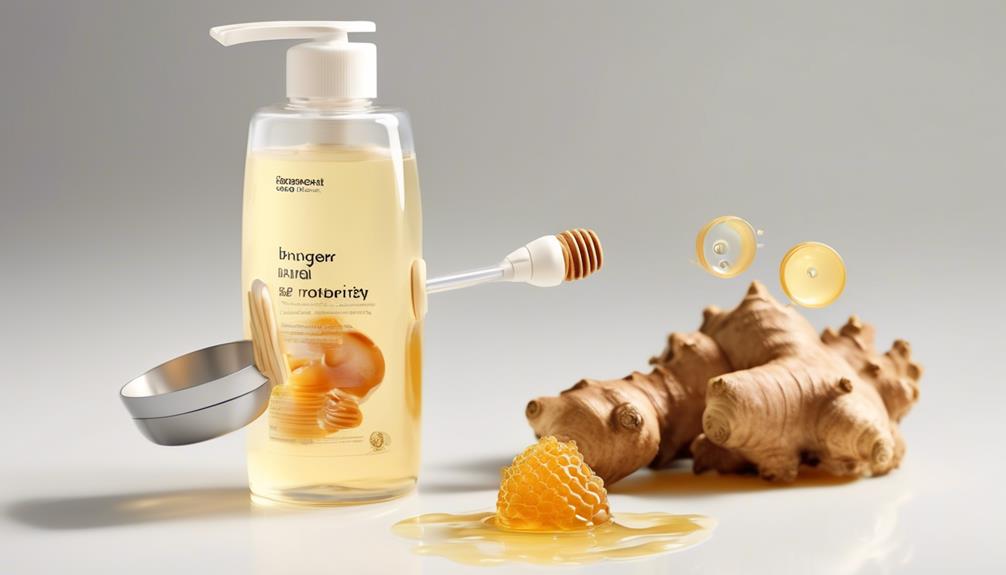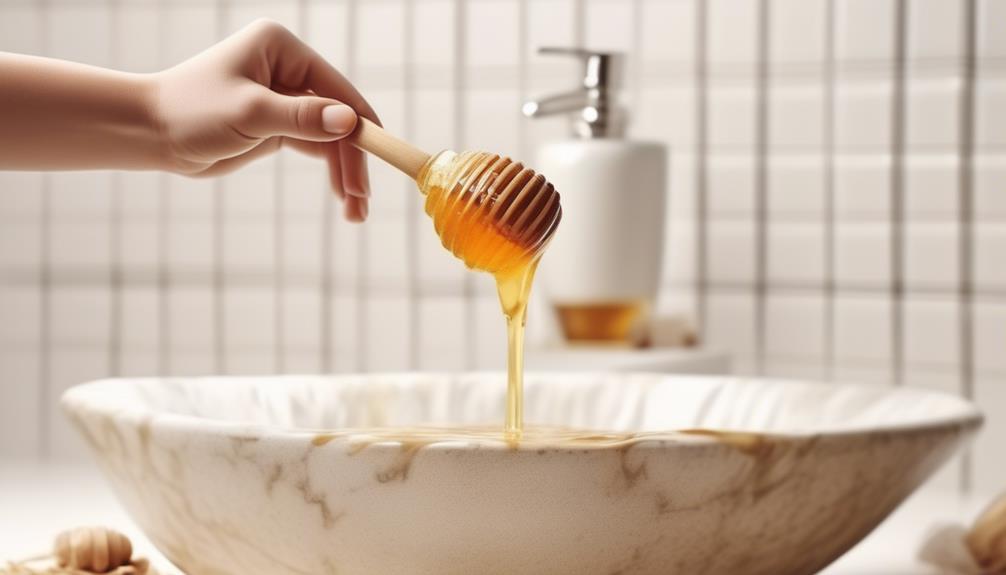Investigate the intriguing synergy between honey and ginger in handwash – a potential game-changer in personal hygiene.

Are Honey and Ginger a Good Combination for a Handwash
Just as bees and flowers engage in a symbiotic relationship, so too might honey and ginger when combined in a handwash.
You might wonder, with honey's well-documented antibacterial properties and ginger's reputed antiseptic qualities, could they form a potent duo in personal hygiene products?
It's an intriguing prospect, isn't it?
While it's easy to see the individual benefits of honey and ginger, understanding their combined effectiveness requires a deeper exploration.
So, let's dissect this unique blend, shall we, and uncover whether honey and ginger truly make a formidable team in a handwash.
Key Takeaways
- Honey's low water activity and natural hydrogen peroxide create an inhospitable environment for bacteria.
- Ginger's gingerol disrupts bacterial cellular structures, providing strong antiseptic properties.
- The combination of honey and ginger offers a comprehensive approach to hand hygiene with synergistic antibacterial and antiseptic effects.
- Honey-ginger handwash provides a natural alternative to traditional options, promoting skin health and environmental sustainability.
Understanding Honey's Antibacterial Properties

To comprehend the efficacy of honey as a key ingredient in our handwash, it's crucial to delve into its inherent antibacterial properties. You see, honey isn't just a sweet treat; it's a potent antibacterial agent. Its power lies in its low water activity, which creates an inhospitable environment for bacteria. It's like a desert where bacteria can't survive.
Furthermore, honey is a natural source of hydrogen peroxide, a well-known disinfectant. This chemical compound is released slowly, ensuring a long-lasting antibacterial effect. Imagine your hands being continuously protected, long after you've washed them. Plus, honey's acidic pH is another deterrent for bacterial growth. It's as if honey was designed for this.
But that's not all. Honey also contains bioactive plant compounds, like flavonoids and phenolic acids, which have been scientifically proven to possess antimicrobial properties. So while you're washing your hands, these compounds are actively fighting off harmful bacteria.
In essence, honey's antibacterial properties are multifaceted, working in tandem to provide a robust defense against bacteria. It's not just about killing bacteria; it's about creating an environment where bacteria can't thrive. So next time you lather up, remember, it's the honey working hard to keep your hands clean.
Exploring Ginger's Antiseptic Qualities

While honey's antibacterial attributes are indeed impressive, let's not overlook the potent antiseptic qualities inherent in ginger – the other key component in our handwash formula. Researchers have found that ginger contains gingerol, a bioactive substance that's demonstrated strong antiseptic properties. It's this substance that fights off harmful bacteria, keeping your hands clean and free from germs.
Now, you might wonder how ginger's antiseptic qualities shine through in our formula. Well, you see, when you apply our handwash, the gingerol in the ginger extract directly engages with the bacteria on your skin. It works by disrupting the bacteria's cellular structures, effectively neutralizing them. This action doesn't just cleanse your hands; it also inhibits the growth and spread of bacteria.
Ginger's antiseptic qualities also offer an added benefit. They can soothe skin irritations and reduce inflammation, thanks to ginger's anti-inflammatory properties. This makes the handwash not only an effective cleanser but also a gentle skin-soothing agent.
The Synergistic Effects of Honey and Ginger

When honey's antibacterial prowess teams up with ginger's strong antiseptic qualities, they create a potent handwash that doesn't just clean, but also actively fights against germ proliferation. This synergistic duo offers more than the sum of their individual effects, creating a formidable defense against harmful microbes.
Honey, with its rich array of antimicrobial compounds, is known to inhibit bacterial growth. It achieves this through its low pH and high sugar content, which create a hostile environment for bacteria. Ginger, on the other hand, contains gingerol, a bioactive compound renowned for its antiseptic and anti-inflammatory properties. When combined, these natural ingredients provide a more comprehensive approach to hand hygiene.
The synergy between honey and ginger works by targeting different aspects of bacterial life. Honey disrupts bacterial cell growth, while ginger's antiseptic compounds work to kill existing bacteria. Essentially, it's like hitting bacteria with a one-two punch – you're hindering their growth and killing them off simultaneously.
Practical Application: Honey-Ginger Handwash

Incorporating honey and ginger into your daily handwash routine can bring about significant improvements in hand hygiene, thanks to their combined antibacterial and antiseptic properties. Let's delve into the practical application of a honey-ginger handwash.
To effectively use this combination, you'll need to understand the right proportions. A good starting point is a ratio of one part honey to two parts ginger extract. You can adjust this to suit your needs, but it's important to ensure that both ingredients are well balanced to maximize their benefits.
Ingredient | Proportion | Benefit |
|---|---|---|
Honey | 1 part | Antibacterial |
Ginger | 2 parts | Antiseptic |
Water | As needed | Dilution |
When you wash your hands, ensure that you're covering all areas and rubbing vigorously for at least 20 seconds. Rinse thoroughly to prevent residue. The honey provides a moisturizing effect, so your hands won't dry out. Meanwhile, the ginger's antiseptic property aids in killing germs effectively.
Embracing this handwash routine could significantly enhance your hand hygiene, offering a natural, cost-effective, and pleasant-smelling alternative to regular hand soaps. It's a practical, beneficial change you can make starting today.
Comparing Honey-Ginger Handwash With Traditional Options

Though traditional hand soaps and sanitizers are common, you might find that the honey-ginger handwash offers unique benefits that could make it a more desirable option. This natural concoction, which combines the antibacterial properties of honey with the anti-inflammatory benefits of ginger, can provide a holistic cleansing experience that commercial products often lack.
Traditional handwash solutions typically contain harsh chemicals and synthetic fragrances that can potentially irritate your skin and induce allergic reactions. They're designed for killing bacteria, but not necessarily for promoting skin health.
In contrast, the honey-ginger handwash isn't only effective in eliminating germs but also in nourishing your skin. Honey, a natural humectant, moisturizes your skin by drawing in moisture from the air. Meanwhile, ginger can increase your skin's radiance and reduce inflammation.
Furthermore, the honey-ginger handwash could also be more environmentally friendly. Many traditional hand soaps contain non-biodegradable ingredients that can harm aquatic life when washed down the drain. The honey-ginger handwash, composed of biodegradable components, poses less risk to the environment.
Conclusion
Indeed, honey and ginger make a potent combo for a handwash. Honey's antibacterial properties and ginger's antiseptic nature work in synergy to effectively clean and protect your hands.
A honey-ginger handwash offers a natural, potentially more skin-friendly alternative to traditional options. However, more research is necessary to determine its efficiency compared to commercial handwashes.
It's safe to say this duo could be a healthy addition to your personal hygiene routine.


